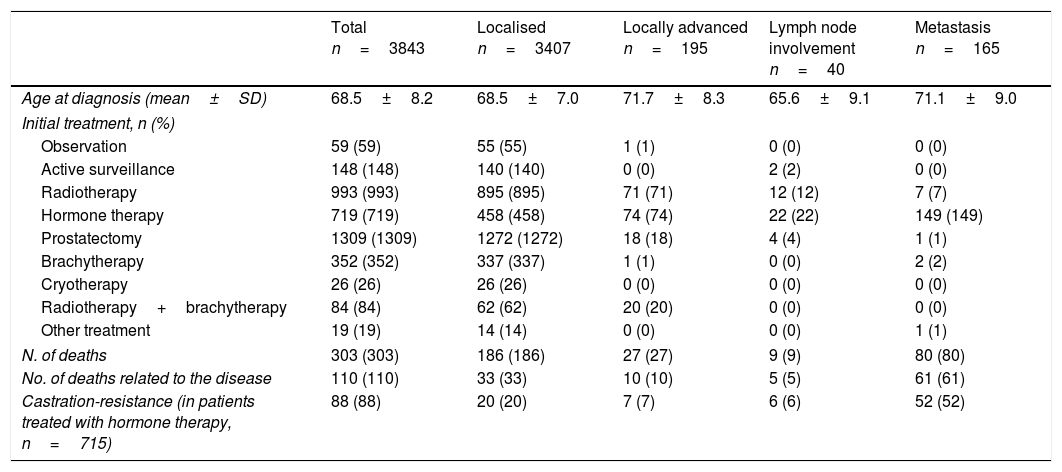To describe the 3-year progression-free survival (PFS), overall survival (OS) and disease-specific mortality in the prospective prostate cancer GESCAP cohort, as well as the progression to castration resistance in patients on hormone therapy.
Material and methodsProspective, observational, epidemiological, multicentre study. Of the 4087 patients recruited, 3843 were evaluable. The variables analysed were the risk group (localised, locally advanced, lymph involvement, metastatic), age, prostate-specific antigen (PSA) levels, Gleason score and initial treatment. Kaplan Meier survival analysis, the log-rank test and the Cox model were used to evaluate the survival data.
ResultsThree-year PFS was 81.4% and OS was 92.4%. During the 3 years of follow-up, 303 patients died (7.9%), 110 of them (36.3%) due to disease-related causes. The probability of castration resistance for all patients on hormone therapy (n=715) was 14.2%: 5%, 9.9%, 26.1% and 44.4% in localised, locally advanced, lymph involvement and metastatic cancer, respectively (log-rank p<0.0001). Patients with metastases had poorer outcomes with respect to PFS, OS, disease-specific mortality and castration resistance. In the multivariate analysis, the Gleason score, PSA and presence of metastases were associated with shorter OS and PFS.
ConclusionsOur study showed stratification of risk, with a more unfavourable prognosis for patients with metastases. Patients with locally advanced disease differed with respect to those with localised disease due to their higher risk as regards disease-specific mortality (Controlled-trials.com ISRCTN19893319).
Describir la supervivencia libre de progresión (SLP), la supervivencia global (SG) y la mortalidad específica en la cohorte prospectiva GESCAP de cáncer de próstata de 3 años de seguimiento, así como la aparición de resistencia a la castración en aquellos pacientes en hormonoterapia.
Material y métodosEstudio epidemiológico, observacional, multicéntrico y prospectivo. De los 4.087 pacientes reclutados, 3.843 fueron evaluables. Las variables analizadas fueron el grupo de riesgo (localizado, localmente avanzado, afectación linfática, metastásico), edad, niveles de PSA, puntuación Gleason y tratamiento inicial. Se utilizaron el método de Kaplan-Meier, la comparación log-rank y el modelo de Cox para evaluar los datos de supervivencia.
ResultadosLa SLP a 3 años fue del 81,4% y la SG del 92,4%. Durante los 3 años de seguimiento, murieron 303 (7,9%) pacientes, 110 de ellos (36,3%) por causas relacionadas con la enfermedad. La probabilidad de resistencia a la castración para el global de pacientes en hormonoterapia (n=715) fue del 14,2%: el 5, el 9,9, el 26,1 y el 44,4% en localizado, localmente avanzado, afectación linfática y metastásico, respectivamente (log-rank p<0,0001). Los pacientes con metástasis tuvieron peores resultados respecto a SLP, SG, mortalidad específica y resistencia a la castración. En el análisis multivariante, la puntuación Gleason, el PSA y la presencia de metástasis estuvieron asociados a menores SG y SLP.
ConclusionesSe demuestra una estratificación del riesgo, con un pronóstico más desfavorable para pacientes metastásicos. Los pacientes con enfermedad localmente avanzada se diferencian respecto a los de enfermedad localizada por su mayor riesgo en cuanto a mortalidad específica (Controlled-trials.com ISRCTN19893319).












